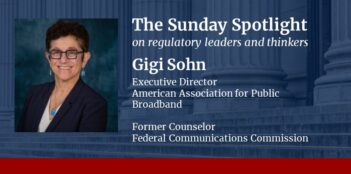
Legislative and judicial challenges seek to block the FCC’s new rules on net neutrality.
Following a process that elicited more than four million public comments, the Federal Communications Commission (FCC) in February approved a net neutrality regulation that supporters say is critical to protecting the freedom of the Internet. However, the two Republican FCC Commissioners dissented against the FCC’s open Internet order, providing a roadmap for challenges to the order by Republicans in Congress as well as major industry actors who have filed lawsuits against the Commission.
The FCC’s new regulation reclassifies broadband Internet from an “information service” to a “telecommunications service” under Title II of the Communications Act of 1934. The “telecommunications service” designation constitutes a “break with the last decade of regulatory policy by treating the Internet like a public utility.” The FCC regulation also bans Internet service providers like Comcast and Verizon from blocking or throttling anyone’s access to a particular website, or from establishing prioritization in “fast lanes” on the Internet.
Opponents of the rule claim the FCC has placed a “heavy hand” on the private sector, which some observers fear will only “open the door to new taxes, lower investment and rate regulation, among other concerns.” The FCC Chairman, Tom Wheeler, characterizes these fears as “myths.”
Nevertheless, Republicans in Congress are pursuing three separate avenues for reversing the FCC’s action.
Representative Marsha Blackburn and 19 other Republicans have introduced a bill in the House that would declare the FCC’s regulation as having “no force or effect.” The bill would also require the FCC to obtain congressional authorization to approve any new regulation that is “substantially the same” as the open Internet order. According to Representative Blackburn, this legislation “will put the brakes on this FCC overreach and protect our innovators from these job-killing regulations.”
At the same time, cable and telecommunications industry lobbyists have initiated an effort to convince lawmakers to support new legislation that would replace the FCC’s Internet regulations.
For example, Representative Greg Walden, the head of the Energy & Commerce Committee’s Subcommittee on Communications and Technology, is trying to convince Democrats to back an alternative bill. He seeks to replace the FCC regulation with legislation that would preserve some net neutrality protections while limiting the FCC’s authority to regulate the Internet. His bill would “implement a number of net neutrality principles that advocates have supported, including restrictions on blocking, throttling and paid prioritization.”
Finally, another group of Republicans, led by House Judiciary Committee Chairman Bob Goodlatte, is proposing a disapproval resolution under the Congressional Review Act (CRA). The CRA establishes a “fast track” procedure by which Congress may “stop federal regulations after they are issued.”
However, this is not as easy as it may sound. Since the CRA was signed into law in 1996, “Congress has successfully disapproved only one set of regulations” under the Act. Any of these legislative actions would require either President Obama’s approval – which he is unlikely to give – or a sufficient number of votes in both houses of Congress to override a presidential veto.
Business groups have begun a private-sector counterpart to the legislative front, and some organizations have already pursued changes to the order through the courts. The U.S. Telecom Association, which represents some of the nation’s largest Internet providers, such as AT&T and Verizon, filed a suit against the FCC in Washington, claiming the new regulations are “‘arbitrary, capricious’ and violate the law.” Texas-based web provider Alamo Broadband has made similar claims in its suit against the FCC in New Orleans.
Chairman Wheeler anticipated court challenges like these would arise. Last year, he predicted “the big dogs are going to sue regardless of what comes out.”
Courts could order the FCC’s rules to be on hold until any relevant litigation is resolved, “which could mean they don’t take effect for years.” For example, when Verizon sued the FCC in February 2002, asking the court to direct the FCC to comply with a June 2001 order, it took three years for a conclusion to emerge. If the FCC’s Internet regulation follows the same path, “a new president will have taken office by the time the issue is fully settled.”



